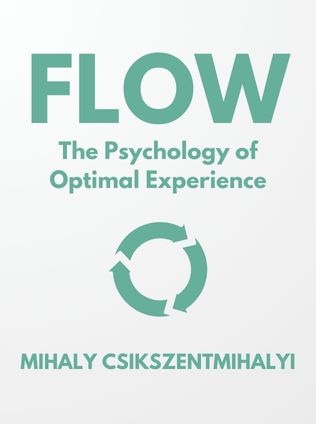
Flow
The Psychology of Optimal Experience
By Mihaly Csikszentmihalyi
Published 01/1990
About the Author
Mihaly Csikszentmihalyi was a pioneering psychologist, renowned for his groundbreaking work on the concept of "flow." Born in Hungary in 1934, Csikszentmihalyi's early experiences during World War II deeply influenced his interest in understanding human happiness and fulfillment. As a young man, he was struck by the stark contrast between material wealth and inner satisfaction, leading him to explore what truly makes life meaningful. His academic journey took him to the United States, where he earned his Ph.D. in psychology from the University of Chicago. Over his prolific career, he became one of the leading figures in positive psychology, a field focused on studying the aspects of life that contribute to human flourishing. His seminal work on flow—a state of deep immersion in activities that are both challenging and engaging—has had a lasting impact on psychology, education, and the broader understanding of human well-being. Csikszentmihalyi's insights emphasize that true happiness is not merely the result of external achievements but is deeply connected to finding purpose and meaning in our everyday lives through activities that resonate with our inner values.
Main Idea
In his influential book, "Flow: The Psychology of Optimal Experience," Mihaly Csikszentmihalyi explores the concept of flow, a mental state in which individuals are fully immersed in an activity, experiencing a sense of energized focus, full involvement, and deep enjoyment. Csikszentmihalyi argues that flow is the key to achieving true happiness and fulfillment, as it allows individuals to reach their highest potential and find meaning in life. The book delves into how flow can be cultivated across various aspects of life, from work and relationships to leisure activities and personal growth. Csikszentmihalyi contends that by understanding and harnessing the power of flow, individuals can lead richer, more fulfilling lives. Flow is not just a fleeting moment of pleasure but a sustainable state of being that enhances our quality of life by aligning our actions with our innermost goals and values.
Table of Contents
- Introduction to Flow
- The Conditions of Flow
- The Benefits of Flow
- Characteristics of Flow
- Finding Flow in Work
- Finding Flow in Relationships
- Navigating Challenges and Trauma
- Finding Meaning in Life
Introduction to Flow
Flow, as introduced by Mihaly Csikszentmihalyi, is more than just a state of mind—it's a key to living a life filled with purpose and satisfaction. Flow occurs when people are so engaged in an activity that everything else fades into the background. In this state, the challenges of the activity perfectly match the individual's skills, creating a balance that leads to deep enjoyment and fulfillment. Csikszentmihalyi describes flow as a state of "being completely involved in an activity for its own sake. The ego falls away. Time flies. Every action, movement, and thought follows inevitably from the previous one, like playing jazz."
Flow is not confined to any specific activity or profession; it can be experienced in almost any endeavor, from sports and creative arts to work and even daily chores. The key to achieving flow lies in finding activities that challenge our abilities and provide clear goals and immediate feedback. When we are in a flow state, we are fully present in the moment, and our consciousness is harmoniously ordered. This state of being not only enhances our performance but also contributes to our overall sense of well-being and satisfaction with life.
The Conditions of Flow
Achieving flow is not accidental; it requires specific conditions that enable this optimal state of consciousness. Csikszentmihalyi outlines the following essential elements:
- Clear Goals: The activity must have a clear purpose and direction. Knowing what needs to be accomplished helps focus the mind and provides a sense of purpose, which is crucial for maintaining motivation.
- Immediate Feedback: Feedback allows for real-time adjustments, keeping the individual engaged and providing a sense of progression. This constant feedback loop is what keeps the flow state alive, as it reassures the individual that they are moving towards their goals.
- Balance Between Challenge and Skill: The activity should be challenging enough to engage the individual but not so difficult that it leads to frustration. This balance is crucial because it keeps the person in a state of flow, where they are neither bored by the task's simplicity nor overwhelmed by its difficulty.
When these conditions are met, individuals can enter a state of flow, where they experience a sense of control, effortlessness, and deep focus. This state of mind is not only enjoyable but also leads to personal growth and self-improvement. The more frequently one can engage in activities that produce flow, the more fulfilling and enriched their life becomes.
The Benefits of Flow
Flow is not just a fleeting state of happiness; it has profound and lasting benefits that extend beyond the moment of engagement. Csikszentmihalyi identifies three primary benefits of regularly experiencing flow:
Sign up for FREE and get access to 1,400+ books summaries.
You May Also Like
The Subtle Art of Not Giving a F*ck
A Counterintuitive Approach to Living a Good Life
By Mark MansonRich Dad Poor Dad
What the Rich Teach Their Kids About Money - That the Poor and Middle Class Do Not!
By Robert T. KiyosakiHow To Win Friends and Influence People
The All-Time Classic Manual Of People Skills
By Dale CarnegieFreakonomics
A Rogue Economist Explores the Hidden Side of Everything
By Steven D. Levitt and Stephen J. Dubner



















